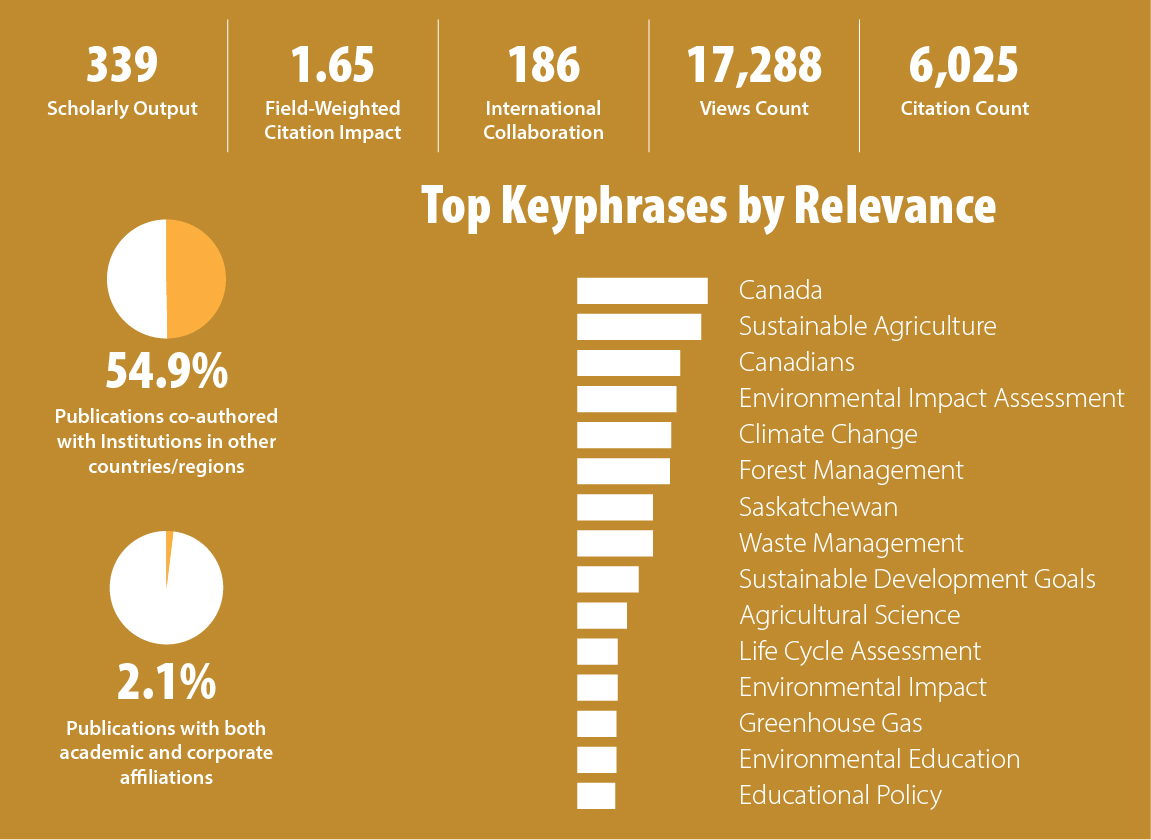Key Facts
Coming Soon!
News
Institutional Stewardship Initiatives
Recycling and Organics Programs
The university is home to a single-stream recycling program provided by Loraas Recycling North Ltd. This recycling program operates the same as the City of Saskatoon’s curbside recycling to reduce confusion between campus and off-campus life.
In 2025, the university signed a secondary contract with Loraas Organics North Ltd. to manage pre-consumer organic waste on campus, including food waste from Marquis Hall and the university’s various other food outlets. Continued work is being done to expand this contract to include post-consumer organics management alongside recycling and landfill bins.
Waste Audits
While invoices provided to the university by its waste contractors provide effective summaries of our total waste outputs and characterization, periodic audits are conducted to obtain a deeper assessment or to provide data on specific events. The last comprehensive waste audit of the university was conducted in 2019.
Marquis Culinary Centre
Sustainability is an essential part of Culinary Services. Through their day-to-day operations, Marquis Culinary Centre is continually finding solutions to reduce waste and use alternative techniques to lessen our environmental footprint, including:- Tray-less dining
- Biodegradable take-out containers, catering trays, and cutlery
- Straw-free dining
- Discounts on coffee for reusable mug users
- Donation of surplus food to social support centres and programs within the community as well as being a FoodRenew Partner.
- Fryer oil recycling
- A well-trained team of staff to operate in the most sustainable ways available to their position.
Research Institutes, Centres, & Projects
Coming Soon!
Research Impact

Sample Courses
The course covers topical issues in food economics and consumer behaviour, the drivers of consumer food choices, and implications for food and agribusinesses. Insights from behavioural economics and marketing are used to explore different models of consumer behaviour, along with methods to measure and evaluate consumer preferences, attitudes, and choice behaviours. Topical issues in differentiated consumer food markets are examined, for example, sustainability, animal welfare, health and nutrition, local foods, and consumer responses to new technologies. Key questions include: what drives consumer behaviours and preferences, what tools are available to measure and evaluate these behaviours and preferences, and what are the implications for the food and agribusiness sector.
Geotechnical aspects of waste and waste containment. Nature of soils, contaminants, and contaminant transport processes in the subsurface. Saturated and unsaturated flow in soils and performance of natural and geosynthetic base barrier, drainage and cover systems. Mechanical aspects and stability of waste containment facilities. Analytical tools and their role in design of containment systems. Key design elements and case studies of municipal, mining and industrial wastes.
The course examines 21st century approaches and frameworks in urban planning, situating these briefly in the evolutionary context of planning movements from the late-19th and 20th centuries. Examples of topics engaged with include: zoning, pricing and urban form; infrastructure asset management planning; neighbourhood, street and public space (re-) design; planning for multiple transport modes; Indigeneity and interculturalism in planning and design; culture planning. The course combines experiential and class-based learning. Individual and group field-based projects form a significant part of the course assessment. A field trip is incorporated into the course.
The principles and the commercial practices of multiplication of plants by seeds, cuttings, division, grafting, and tissue culture are covered. Labs are hands-on with a goal of developing skills and involve doing experiments. Specific papers on plant propagation are read, analyzed, and discussed.
For a full listing of related courses, please visit the Office of Sustainability's sustainablity course inventory.
Key STARS Reporting Areas
- OP-11: Sustainable Procurement
- OP-12: Electronics Purchasing
- OP-13: Cleaning and Janitorial Purchasing
- OP-14: Office Paper Purchasing
- OP-18: Waste Minimization and Diversion
- OP-19: Construction and Demolition Waste Diversion
- OP-20: Hazardous Waste Management
- IN-32: Single-Use Plastic Ban
- IN-46: Zero Waste Certification
